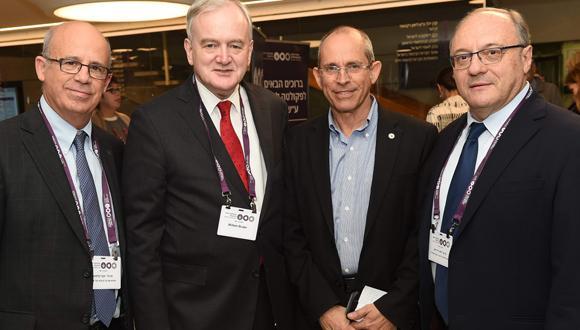Economic Forecast for 2018—“The 100 Club”
“The 100 Club” event of Tel Aviv University’s Coller School of Management took place on Monday evening, 15 January 2018, with the participation of the business community, alumni and friends of the Coller School.
This was the third meeting of the 100 Club, which was inaugurated a year ago, and it was opened by Prof. Joseph Klafter, President of Tel Aviv University, and Prof. Moshe Zviran, Dean of the Coller School, who heads the 100 Club, together with Zohar Zisapel, an entrepreneur and founder of the RAD Group and an alumnus of the Coller School.
In his opening address, Prof. Zviran said that the 100 Club enables discussion of the trends influencing the world of management, such as the economic forecasts, which have a substantial impact on the business plans and strategies of companies in general and multinational corporations in particular. Prof. Zviran presented Innovations in Management, a new academic journal published by the Coller School, which relates to trends and innovations in the field of management in an era of ongoing and frequent changes, and includes research studies, surveys and critiques of focal issues in the world of management.
The guest speaker at the meeting, Prof. Willem Buiter, chief economist of Citigroup, related in his talk to the economic forecast for 2018 and onwards, saying that a large part of the momentum in global growth is a cyclic rather than a permanent phenomenon, and it may well be that from 2019 we will begin to see a correction of the current very positive wave in the economic cycle in the direction of a slowdown in world economic growth. In relating to the financial markets, Prof. Buiter stressed his fear that stock prices are too high and cannot be justified by expected future business profitability.
At the end of Prof. Buiter’s talk, Prof. Leo Leiderman, from Tel Aviv University’s Eitan Berglas School of Economics, and chief economist at Bank Hapoalim, led a discussion with the audience on the issues Prof. Buiter raised. Prof. Leiderman presented a position slightly different from that of Prof. Buiter, stressing that the main factor currently influencing the financial markets is the zero interest rates of the central banks and their massive liquidity injections, adding that since at the moment no significant correction of the interest rates in the world appears to be on the horizon, except for the two or three interest rate hikes in the USA, it is reasonable to assume that the momentum in the financial markets will continue.
Prof. Buiter also related to the Bitcoin, predicting that the virtual and pirate currencies will disappear and be replaced by e-currencies, which will be issued by the central banks.
In summarizing and on a personal note, Prof. Leiderman asked Prof. Buiter what it was like to be married to an economist and what they talked about at home. To this, Prof. Buiter answered that fortunately for him economics is not just his work but also his main hobby, so he enjoys talking economics with his wife.
Dr Yaniv Shani, from the Coller School, presented insights from his research on consumer decision making, on the connection between consumers’ emotions and behavior, and particularly on the strategy consumers adopt in order to justify wasteful purchasing decisions. When a consumer makes a decision which he doesn’t always see as being economically correct, he has to contend with an array of emotions and conflicts in justifying the decision. The research helps in understanding the process and factors influencing the everyday economic decisions that consumers make.
Among the issues that Dr Shani discusses in his research on the impact of consumer regret on purchases made is the obsessive need people have to continue to check the price of a product or service even after they have made the purchase and the impact of the feelings of regret on their future purchases. Together with colleagues on his present research, Dr Shani even shows that consumers in an effort to justify a wasteful purchase tend to be less careful about their cellphones when a new i-phone is coming out that is not a significant technological advance, so that there is an increase in the number of damaged cellphones offered for sale on the market. This is even more evident in the case of a more attractive, innovatively designed model that has no practical reason to be considered as a replacement. On the other hand, in the case of a more technologically advanced model, there is an increase in the sales of used cellphones and not damaged cellphones. Dr Shani indicates that, since consumers do not wish to perceive themselves or be perceived as wasteful, prior to the appearance of a new i-phone model, an increase in the sales of used or damage cellphones can be expected.
Among the participants in the event were Raya Strauss, Alfred Akirov, Amnon Neuman, Gabi and Etti Roter, Neil Korani, Amikam Cohen, Gil Sharon, Ravit Bar Niv, Danny Goldstein, Prof. Yossi Gross, Yossi Pilos, CPA, Ronen Barel, CPA, Attorney Maya Liquornik, Leon Recanati, Yair Seroussi, Dror Gad, Tzahi Weissfeld, Ron Fainaro, Dganit Palti, CPA, Reuven Schiff, CPA, Izhar Shay, Yoav Chelouche, Amnon Dick, Dr Giora Yaron, Prof. Orly Yeheskel, Prof. Shai Danizer.





